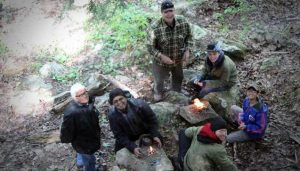 Preparation in today’s day and age is a must. To assume that a natural disaster, a home invader, or a financial collapse won’t affect your family is a tad naïve. Preparation is about attempting to foresee the potential disasters, creating a stockpile of goods, learning the necessary skills, and creating a contingency plan to deal with the situation. As a parent, the task of disaster preparation is even harder. You not only have to prepare yourself, you have to teach your children what to do in case of a disaster.
Preparation in today’s day and age is a must. To assume that a natural disaster, a home invader, or a financial collapse won’t affect your family is a tad naïve. Preparation is about attempting to foresee the potential disasters, creating a stockpile of goods, learning the necessary skills, and creating a contingency plan to deal with the situation. As a parent, the task of disaster preparation is even harder. You not only have to prepare yourself, you have to teach your children what to do in case of a disaster.
Teach Preparation, Not Paranoia
Before we get started on the nitty-gritty details, I feel I must caution that parent to keep in mind that the information about potential disasters and tactics to deal with them must be imparted gently and with care. If your tactics are scaring or causing paranoia to the point where your kids can’t function normally, you might want to take a step back and rethink your tactics.
Model Preparation
One of the most vital tactics to teach disaster preparation is to be prepared. Be the man or woman that you want your children to be. Children learn a lot of their beliefs, values, and behavior from observing their parental figures. If they see you doing safety drills, stockpiling food, talking about safety with the family, they will be more likely to internalize the values and behaviors that you are exhibiting before they fully realize why. And gradually as the years pass, they will grasp the importance of living their life in a prepared manner.
Talk about the Contingency Plan and Safety
You may be of the opinion that your child isn’t old enough to know about the dangers of the world. That is a valid parenting choice, but you should not leave them completely defenseless and unprepared. You can tell them what to do in case of an emergency without spelling out the potential disasters that might affect the family.

Children can learn valuable skills from you.
You tell your kids not to get into cars with strangers, but leave out all the potential reasons why someone would kidnap a child. Why? Because you won’t always be there. Preparation for natural disasters, financial hardships, and home invasions are much like that. You won’t always be there when a hurricane approaches or when an intruder invades your home.
And if you are there, you might need to focus on other tasks. You might have a limited amount of time to board up the windows or collect the back packs of supplies. Having a child wander off to play at an inopportune time could be potentially disastrous. Even children must do their part to ensure the safety of their family. Give them the knowledge to do so.
Regular Drills of Contingency
Plans
The goal of a contingency plan is to have the family complete the actions required in a safe and time efficient manner. It may seem juvenile, but drills are paramount. Completing the safety drill over and over again will make grabbing supplies, making home preparations, and getting out of the house second nature. Before the drill the knowledge was intellectual. Intellectual knowledge of what they should do in a natural disaster is faulty. The memory might fail them and fear might make them forget. After the drills, their bodies will know what must be done as if on autopilot. You should do the drills at least once every two weeks until the family can do them effortlessly. After the family has them down, you can do the drills once a month.
Make Learning Skills and Running Drills Fun
Children, especially children that do not understand the importance of preparing for disasters, can be uncooperative. There are so many more appealing activities that they could be doing in their free time. As much as you can, you should strive to get the children to enthusiastically engage in the drills and skills.
- Turn drills into a game or a fun competition.
- If necessary offer awards for willingly becoming involved in preparation activities. You should not give them awards for intellectual or physical merit because your goal should be to promote a life time dedication to preparation. Rewarding intellectual or physical accomplishments might increase the knowledge in the present, but it will decrease their dedication to preparation for the long haul.
- Sign the child up for classes in Karate, Kayaking, Swimming, and other skills. If they take a liking to one of them, sign them up for the long haul.
- Take the child camping and share your love of fishing and hunting in order to teach children to survive without modern grocery stores.
Being prepared is more than an activity. It is a lifestyle choice that has the capability of assuring a long life for you and your family. Through parents, children can learn the importance of preparing for disasters. You can teach your kids in a variety of ways. The end result should always be the same: a child with the tools to survive with and without the parent’s guidance.
Source:http://www.theprepperjournal.com/2013/10/01/teaching-your-kids-to-be-prepared/
